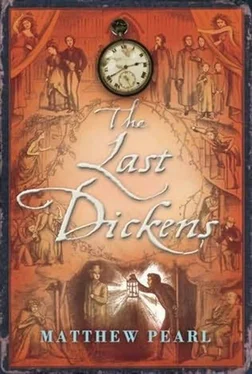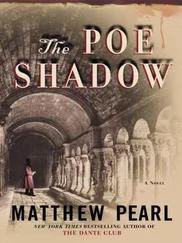“Yes, Mr. Osgood,” Rebecca said dutifully, each step taking her back to the normality and routine of daily life in Boston.
Osgood looked over the room and at his two companions as Rebecca prepared a cable and Tom continued to try to persuade him. Osgood knew that to yield and go home was the proper, rational, responsible decision-really, the only decision he, James Ripley Osgood, could possibly make without some countervailing mandate from the heavens.
“We are too late to do anything for ourselves, in any case,” Osgood said. “The Harpers will soon be able to publish all that was left of Edwin Drood. We will have to bear the loss and move on. Our rivals will see we are vulnerable. Fields will need us both in Boston to do what we can.”
Tom stepped in front of Osgood and held up his hand. “Mr. Osgood, I give you my hand-I give you my word with it-that if you wish to try longer to investigate I shall be standing by your side.”
Osgood, with a small smile, took Tom's hand in both of his, as Jack Rogers had done in their first encounter in the Gadshill chalet, but shook his head in a final refusal. “Thank you for all you have done to aid us, Tom. Godspeed to you.”
“Godspeed, Mr. Osgood,” Tom said, sighing. “I am only sorry your time here has to end like this. Mr. Dickens-and you-deserved something more.”
“To have gained your friendship has been worth all of it,” Osgood replied.

New York City, July 16, 1870
WHILE OSGOOD WAS HASTILY CLOSING THEIR BUSINESS IN London and preparing for departure, there was a conversation involving him inside one of the more luxurious coaches crammed into the thundering roar of Broadway in New York City. Out of its window, a tall hat and long muttonchops belonging to a grizzled head appeared, and the face between them inclined into a snarl at the tight traffic.
“So tell me, where in hell is that gump now?” Fletcher Harper, ducking back into the carriage, removing his tall black hat from his curly brown head, bellowed as his span of horses clopped to an irritable stop behind an omnibus.
“I'm sure I don't know, Uncle,” said his riding companion. “But father trusted him.”
“Oh! I know he did,” the Major said with his usual tone of bemused bitterness. “It is a big mistake, Philip. Take the next right turn away from this mess!” He stretched his neck out the window, installing his hat once again for the moment, and yelled to the driver.
“What mistake?” asked the companion, Philip Harper, son of Fletcher's late brother James, and now chief of the financial de partment, after his uncle had returned his neck and head inside the vehicle.
“Come! Trusting a man not named Harper. You will learn to avoid the practice before long, Philip, as this world goes. Your father always put too much faith in his Harper's Police to solve our problems. And now because of it here we are, and Jack Rogers has ceased communication. For all we know, that blackguard may have changed allegiances to another publisher for a higher fee-if he learned any secrets in England about Dickens, he may be using them against us, perhaps with the help of Osgood, with an eye on tendering a greater profit.”
The Major's counsel on trusting only individuals with the name Harper could have been noted as quite sustainable when entering the daunting fortressed offices at Franklin Square. There were multiple Fletchers, Josephs, Johns, this eager Philip, a lone Abner, sons of the original brothers, in varied roles managing the periodicals and production, with a line of grandsons already coming up as shop boys.
Franklin Square was Harvard and Yale for them. “When my flame expires,” the Major would say to each of them as a kind of introductory address, “let true hands pass on an unextinguished torch from sire to son!” This saying was also roughly the translation of the publishing house's Latin motto on the insignia of a flaming torch.
The Major, as he was entering, was told by a tremulous clerk that his expected visitors were waiting in the counting room.
“They are… impatiently waiting, I should say, Major,” said the clerk.
“Let them wait, it shall increase their hunger for my gold. And Mr. Leypoldt?” asked the Major.
“He sent a message and is to come at three,” the clerk replied. “And Mr. Nast is waiting in your private office with a new Tweed drawing.”
“Good!” the Major replied.
“That's Mr. Leypoldt from the publishing journal, Uncle?” asked Philip.
“Yes, and we shall pour into him as many bottles of champagne as it takes to persuade him to sing the praises of Harper and Brothers in his columns. First, we have a different type of business. A more precarious kind.”
“Shall I leave you now?” Philip Harper asked his uncle discreetly.
“Don't think of it! You are to learn everything connected to our business, Philip, just as Fletcher Junior will,” the Major said, clamping down on his arm and pulling him along. “Now, you see our friend up there?”
Philip followed the Major's gaze to a bust poised above the doorway to the main offices.
“Benjamin Franklin, isn't it, Uncle Fletcher?” asked Philip of the judgmental bust.
“Correct. Not only one of our nation's founding geniuses but a printer and publisher, too. To this craft he applied his industry and thrift. You see, he knew that to form the soul of America, one must control the presses. The basis of our firm is character, not capital, just as it was with him. Remember that, and you shall truly be a part of Harper and Brothers.”
In the great open office of the upper floor, the senior of the two Harpers guided them to a rectangular space closed in by a railing. Near the far wall was a circle of sofas and chairs meant for authors and other distinguished visitors to the firm, but on this day they hosted a different sort of occupant. In various positions of repose and sublime agitation, there were gathered four of the most striking and diverse individual human beings ever seen together in any publishing office.
Philip stopped in midstride and gave an anxious, gawky smile. “Why, Uncle Fletcher! Are those-”
“The Bookaneers!” the Major finished his exclamation in a hoary whisper. “The best of the lot, anyway, and all in one place this time.”
There was the smooth, chocolate-colored Esquire, in his high-fashion silks and velvet and thick boots, looking an odd combination of actor and workman and balancing a walking stick on his lap; Molasses, with the particolored growth undulating down his jaw and chin and dirty neckcloth; the lone woman of the group, called Kitten, also known by other mysterious appellations, who was unaging and ageless-those blue eyes might have been through twenty or forty summers, depending on what angle and light flattered them; and breathing in heavy, labored contortions while sitting next to her, the seven-foot-tall man named Baby, a former circus giant, masticating a quid of tobacco between his monumental teeth.
“Uncle Fletcher,” said the young apprentice, “those people are the scum of the land!”
“Well!” the Major replied, smiling with genuine amusement at his green nephew. “If we cannot find Jack Rogers, it shall be near impossible to know what that James Osgood has been up to, and what he and Fields have in store for the last Dickens book. We are good Methodists, boy, but we cannot sit with our hands in our pockets waiting for our destiny. We must arm ourselves against the successes of our rivals, Philip. These scum, as you call them, might have been ordinary readers, writers, or publishers, but instead have become shadows of each, and as such can do what we cannot, can go where we cannot. You shall learn that you cannot count on a domestic cat, when the arts of a Bengal tiger are called for.”
Читать дальше













